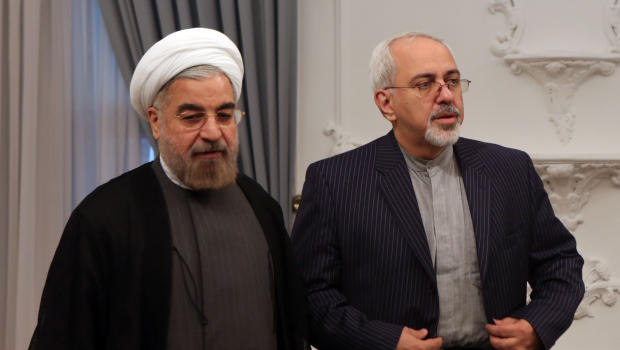The rhetoric emanating from Tehran in response to the prospect of Western military intervention in Syria has been marked by two diverging strands — on one hand, the defiant, at times bellicose, line from certain military, political and Revolutionary Guard figures, and on the other, the call for “prudence” coming from President Hassan Rouhani’s office.
These two strands — the “defiant camp” and the “prudent camp” — shed light on conflicting opinions held by different groups and actors inside Iran over how the Islamic Republic should respond to American intervention.
The “defiant camp” appears for the most part to be linked to the Supreme Leader’s office and people either close to him, or who hold “hardline” views on the continuing role of the Islamic Revolution, and how to “export” that revolution and project Iranian power in the region.
The Parliament’s Director General for International Affairs Hossein Sheikholeslam declared on Monday that if the United States intervenes in Syria, “the first victim… would be the Zionist regime [Iran’s hardline term for Israel].”
On Wednesday, the Supreme Leader used a colorful metaphor to warnthat US intervention would lead to Americans being entangled in a situation similar to its past wars in Afghanistan and Iraq: “Such warmongering is like a spark in a gunpowder depot whose true dimensions and consequences cannot be estimated.”
Mohammad Ali Jafari — the powerful commander of the Revolutionary Guards, which strongly supports Assad and which has admitted involvement in Syrian reconstruction and logistical efforts, has also attempted to deter a U.S. attack on Syria by raising the specter of past regional wars, declaring on Thursday that an American strike on Syria would result in “the second Vietnam.”
Yet, amidst all this defiant — often hyperbolic — rhetoric, President Rouhani has maintained a more moderate line, one which those closest to him have echoed.
On Tuesday, Rouhani used his English-language Twitter account, aimed at a Western audience, to give “notice to international community to use all its might to prevent use of chemical weapons anywhere in the world, esp. in #Syria.”
Foreign Minister Mohammad Javad Zarif’s foreign policy statements — on issues such as Iran’s nuclear programme; engagement with the US; the wider Middle East — since the election in June have indicated a shift towards moderation, and away from the more belligerent tone that epitomized former President Mahmoud Ahmadinejad’s administration.
On Friday, Zarif, reiterated Rouhani’s call for “prudence” — the new President’s campaign slogan and a term that he is trying to associate with his style of governance — regarding the Syria conflict in a six-point message posted on his Facebook page, which offers an explanation of his intellectual position on the situation. It is noticeable that this message is in English — and, like Rouhani’s tweets, designed for a Western audience — a move that stands out against Zarif’s other Facebook entries, which are in Persian.
Zarif writes that: “Any use of chemical weapons must be condemned, regardless of its victims or culprits,” but questions whether this has “always been the position of those who are now talking about punishing their presumed culprit?”
He adds that: “the circumstances and available evidence indicate the likelihood of the use of chemical agents by extremist groups.”
That is not to say that Zarif does not strongly oppose American intervention for political and strategic reasons.
Like Rouhani — and those in the “defiant camp” — Zarif opposes US intervention, but rather than threatening what would happen if Washington strikes Syria, he emphasizes the call for a diplomatic solution instead of military intervention. He goes on to question whether force can really be the solution to “Violence, repression, killing and extremism” or if it will simply perpetuate it.
Zarif is clearly critical of the United States and the possibility of some form of military intervention. He questions Washington’s adherence to international law and the UN Charter, and the eagerness with which some US officials seem to be pursuing a military strike. He also makes a veiled reference to the lessons — and failure — of George W. Bush’s “shock and awe” rhetoric in Iraq.
However, the significance of his comments — and those of Rouhani — lies in the fact that the “prudence camp” does not seek to ratchet up the tension between the West and Iran by, for example, threatening Israel with retaliation.
Instead, Zarif concludes “Let us hope that we can avert another catastrophic adventurism.”
By continuing to advocate a diplomatic solution, Rouhani, via Zarif, is indicating that engagement with the U.S. is still on the cards in spite of the increasingly thorny issue of Syria.
The question therefore is whether the rhetorical split between “defiance” and “prudence” is indicative of a more concrete split between the Supreme Leader, the Revolutionary Guards and military elements on the one hand, and Rouhani and Zarif on the other.
Or is the “defiant camp’s” bellicose rhetoric simply a safety valve to allow Tehran to project an image of firm support for its ally, Bashar al-Assad, while in reality it is Rouhani’s message of “prudence” that will be pursued?

